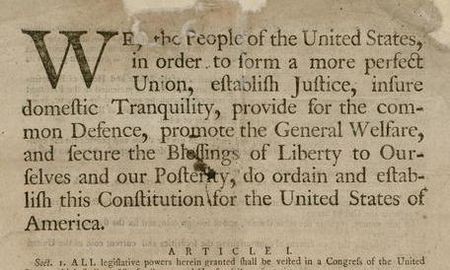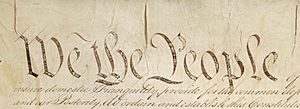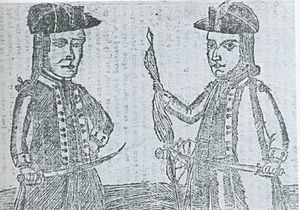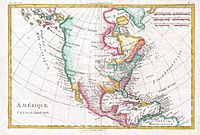Preamble to the United States Constitution facts for kids
The Preamble to the United States Constitution is a short introduction to the United States Constitution. It starts with the famous words We the People. This introduction explains why the Founding Fathers created the Constitution. It also shares what they hoped the Constitution would achieve for the country.
Interestingly, the Preamble was added to the Constitution at the very last minute. It wasn't discussed or voted on during the Constitutional Convention. A person named Gouverneur Morris, who helped write the Constitution, wrote and added it right before the final document was finished.
Contents
- What the Preamble Says
- How the Preamble Was Written
- Understanding the Preamble's Phrases
- We the People
- To Form a More Perfect Union
- To Establish Justice
- To Insure Domestic Tranquility
- To Provide for the Common Defence
- To Promote the General Welfare
- To Secure the Blessings of Liberty to Ourselves and Our Posterity
- To Ordain and Establish This Constitution for the United States of America
- See also
What the Preamble Says
We the People of the United States, in Order to form a more perfect Union, establish Justice, insure domestic Tranquility, provide for the common defence, promote the general Welfare, and secure the Blessings of Liberty to ourselves and our Posterity, do ordain and establish this Constitution for the United States of America.
How the Preamble Was Written
The Preamble was put into the Constitution during the final days of the Constitutional Convention. A group called the Committee on Style, led by Gouverneur Morris, wrote the final version. The Preamble was not talked about or voted on by the whole convention before this.
The first ideas for the Preamble did not say "We the People of the United States." Instead, it talked about the people of the different states. This was normal for documents back then. For example, the 1778 Treaty of Alliance with France and the Articles of Confederation listed each state by name.
The change to "We the People" was made because of how the Constitution would be approved. Article Seven said that only nine states needed to approve the Constitution for it to start. No one knew which states would agree. So, the Preamble could not list all thirteen states. Also, if new states joined later, their names could not be added. Because of these reasons, the Preamble had to begin with "We the People."
Understanding the Preamble's Phrases
The Preamble has several very important phrases. Each one has a special meaning:
We the People
"We the People" means all the citizens of the United States.
These first words of the Preamble were very different from any other treaty or law the United States had written before. For example, the United States' first constitution, the Articles of Confederation, called itself an agreement "between the States." Then it listed all thirteen states. Treaties the United States signed were also agreements between states, not people.
At the time, Gouverneur Morris chose to write "We the People" instead of listing all thirteen states. This was important for a few reasons. First, Article Seven of the Constitution said that only nine states had to approve the Constitution for it to start. Nobody knew which states would ratify (approve) it. So, the Preamble could not list all thirteen states as if they had all agreed. Also, if other states joined the United States later, it would be impossible to add their names to the list. For these reasons, the Preamble had to start with "We the People."
The words "We the People" became a strong statement. They showed that this new government was made by the people of the United States, to help the people of the United States. When Virginia's leaders were debating the Constitution, Governor Edmund Randolph said: "The government is for the people; and the [problem] was, that the people had no [power] in the government before." He argued that if the people had to follow the government, then the people should be the ones to create that government.
To Form a More Perfect Union
"In order to form a more perfect union" means to create a better country than before. This idea likely came from a book called Commentaries on the Laws of England by Sir William Blackstone. Many of the Founding Fathers had studied his work. Blackstone said that England's constitution was perfect but always getting better. So, "a more perfect union" simply meant a better one than any before the Constitution.
Before the Constitution, the United States was based on the Articles of Confederation. However, the Articles gave very little power to the federal government. They did not give the United States government enough power for the country to work and grow well. Each state often acted for itself, instead of working together. Sometimes they acted like thirteen separate countries that would only unite if another country attacked them.
To Establish Justice
"Establish justice" meant to create the rule of law. This meant that everyone would be equal before the law. There would be no difference based on a person's status or wealth. With their new government, the Founding Fathers wanted to create fairness. When the British Empire ruled the American colonies, the colonists felt the government was not fair. For example, the British Parliament would make the colonists pay taxes on things like stamps and goods made in other countries. The colonists had no say in these decisions.
Even after the United States became independent, many of the Founding Fathers thought that the states had too much power under the Articles of Confederation. They believed the states had taken away people's rights.
For example, during Shays' Rebellion in Springfield, Massachusetts, the state of Massachusetts:
- Took away the right to habeas corpus (so they could keep people in jail without a trial)
- Took away people's right to say bad things about the government
- Took over an armory (a building where weapons are kept), even though it belonged to the United States government, without permission.
To Insure Domestic Tranquility
"Insure domestic tranquility" means to make sure there is peace and order within the country. Shays' Rebellion was still fresh in the minds of the people who wrote the Constitution. This rebellion made many fear that the spirit of the American Revolutionary War might be getting out of control. There was a clear need to keep peace in the new country.
Just five years after the Articles of Confederation were approved in 1781, many Americans were unhappy with them. Many of the Founding Fathers thought the Articles had made the United States government too weak. Shays' Rebellion showed very clearly that the national government under the Articles of Confederation was not strong enough. Daniel Shays, a veteran of the American Revolutionary War, led rebel farmers trying to overthrow the Massachusetts government. The farmers had formed an entire army. Neither the state nor the federal government had enough soldiers or money to fight them. In desperation, Massachusetts offered to pay for a private army to fight the rebellion. Finally, in 1787, that private army defeated the rebels.
John Jay, one of the Founding Fathers, said that after the United States government could not pay for soldiers to defend against any armed rebellion: "the inefficiency of the Federal government [became] more and more [obvious]." Another Founding Father, Henry Knox, said that Shays' Rebellion convinced many people that the United States needed a stronger federal government. The Rebellion made it clear that the states were not protected, and if they were attacked, they would be on their own.
To Provide for the Common Defence
"Provide for the common defence" meant that the people who wrote the Constitution knew that being independent from Great Britain did not mean they were safe. British Canada to the north still had many angry loyalists. To the west were unknown numbers of hostile Native American tribes. Farther west was the huge Louisiana territory held by France. To the south, the Spanish controlled Florida. Even worse, these powerful countries were fighting many wars in Europe that affected much of North America. The framers knew America needed to protect itself. Providing for the common defence meant the new government would make sure all the states were protected and defended if attacked.
To Promote the General Welfare
"Promote the general welfare" is a basic goal of all governments. It was a main reason for having a constitution.
In general, this part of the Preamble means that one of the new government's jobs would be to make things better for the whole country. Specifically, this part of the Preamble talks about the government's powers to tax people and spend money. It means that the new government will only have the power to tax and spend on things that are good for the entire country. The government will not be allowed to spend money on things that will only help a small part of the country, or only some people.
For example, Article One, Section 8 of the Constitution gives Congress the power to tax people and spend money on creating Post Offices and building roads for mail carriers to use. Congress can do this because Post Offices will "promote the general Welfare"—everybody in the country will benefit from being able to send and get mail.
To Secure the Blessings of Liberty to Ourselves and Our Posterity
"Secure the blessings of liberty to ourselves and our posterity" was important because many people had come to America from places with little political or religious freedom. This phrase shows that the new government intended to protect the newly-won freedoms. It also aimed to protect against a tyrannical (unfair and cruel) government.
However, the Articles of Confederation were mostly about states' rights. At that time, many people were afraid of having a federal government that was too strong. These people were called anti-federalists. They included some of the Founding Fathers, like Patrick Henry and James Monroe. The anti-federalists worried that a strong federal government could become tyrannical and take away the rights of individual states, just like they thought the British colonial government had done. They also worried that a government led by a President might turn into a monarchy, where the President would become a King and have total power. Because of these worries, the Articles of Confederation focused on states' rights, not individual people's rights. The framers wanted to establish these rights for the people of the United States and their "posterity," meaning all the generations of Americans who would follow.
To Ordain and Establish This Constitution for the United States of America
"Do ordain and establish this Constitution for the United States of America" is perhaps the strongest statement in the Preamble. It means that the people themselves created the Constitution, and it is the people who give it power.
The Preamble to the United States Constitution is the beginning of the Constitution. It is not a law itself. Instead, it talks about the Founding Fathers' reasons for writing the Constitution and what they hoped the Constitution would achieve.
See also
 In Spanish: Preámbulo de la Constitución de los Estados Unidos para niños
In Spanish: Preámbulo de la Constitución de los Estados Unidos para niños
 | Aurelia Browder |
 | Nannie Helen Burroughs |
 | Michelle Alexander |





